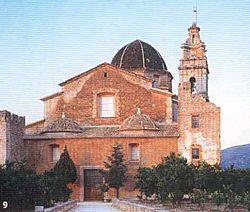Monastery of Santa María de la Valldigna facts for kids
 |
|
| Monastery information | |
|---|---|
| Full name | Monastery of Santa María de la Valldigna |
| Order | Cistercian |
| Established | 1297 |
| Disestablished | 1835 |
| Diocese | Valencia |
| People | |
| Founder(s) | James II |
| Site | |
| Location | Simat de la Valldigna, (Valencian Community) |
| Coordinates | 39°02′00″N 0°19′00″W / 39.03333°N 0.31667°W |
| Visible remains | Restored |
| Public access | Yes |
The Monastery of Santa Maria de Valldigna is a very old and important building. It is located in a place called Simat de la Valldigna, which is in the Valencia region of Spain. A monastery is a special place where monks live and pray.
Contents
History of the Valldigna Monastery
How the Monastery Started
The Monastery of Santa Maria de Valldigna was built a long time ago, in the year 1297. It was founded by a king named James II of Aragon. He was a powerful ruler in the region.
From the very beginning, this monastery was very important. It belonged to the Cistercian order. Cistercian monks live a simple life focused on prayer and work. The first monks who came to Valldigna were from another monastery called Santes Creus. This monastery was in the Tarragona province.
King James II made a special rule. He said that the entire Valldigna valley would belong to the monks. This meant they owned a lot of land around the monastery.
A Time of Change
The monks lived in the monastery for many centuries, until 1835. In that year, there was a big change in Spain. The government decided to take over many church properties. This event is sometimes called the "Ecclesiastical Confiscations."
Because of these changes, a protest happened in the Valldigna valley. The monks were forced to leave their home. Many of the valuable items and artworks from the monastery were sold, stolen, or destroyed.
Bringing the Monastery Back to Life
After the monks left, the monastery was left empty for many years. It became old and started to fall apart. But then, the Generalitat Valenciana, which is the local government of the Valencian Community, decided to help. They started a big project to fix and restore the monastery.
Today, the Monastery of Santa Maria de Valldigna is seen as a very special place. The laws of the Valencian Community say it is a "spiritual, historical, and cultural temple." It is also a symbol of the history and importance of the Valencian people.
The government is working to make sure the monastery is saved and kept safe. A law from the Valencian Parliament helps decide how the monastery will be used. It is meant to be a place where all Valencians can meet. It is also a center for studying the history of the Valencian Community.
Other Interesting Places to See
See also
 In Spanish: Monasterio de Santa María de la Valldigna para niños
In Spanish: Monasterio de Santa María de la Valldigna para niños
 | Victor J. Glover |
 | Yvonne Cagle |
 | Jeanette Epps |
 | Bernard A. Harris Jr. |


